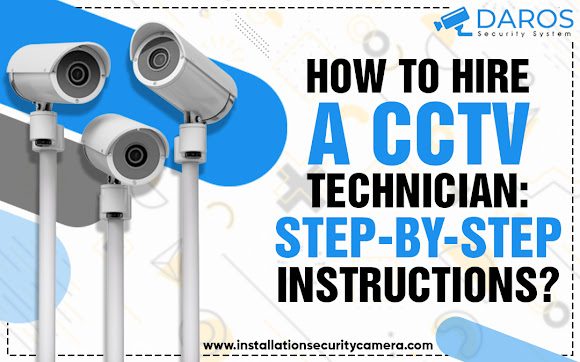Wireless vs. Wired: Which Security Camera Installation Option is Best for You?
Security camera installation preparation requires selecting
between wireless and wired systems as the most vital decision. The selection
between wireless and wired systems depends on location requirements and
security goals because each choice offers unique benefits and disadvantages.
The understanding
of their distinctions allows for better-customized setups in surveillance
systems that serve business establishments.
Understanding the Basics: Wired vs. Wireless
Wired security
cameras are powered, transmit video, and access the internet via cables. Wired
systems usually tie into a main recording device, giving steady and
high-quality video streams. Wireless cameras send information via Wi-Fi or
other wireless networks and sometimes use batteries or outlets.
Although wired
systems have their merit in reliability, their wireless counterparts provide
more flexibility in their placements and installations. For the purposes of CCTV installation in Miami, both can find applications in
various property configurations and their respective monitoring requirements.
Performance and Reliability Comparison
The main
distinction between wireless and wired solutions emerges from their different
performance reliability characteristics. Wired cameras operate independently
from wireless signal interference and network traffic. These systems deliver
uninterrupted video streams because they experience minimal lag or pixelation
issues.
Wireless cameras
provide user-friendly operation, but their performance can be affected by the
distance of their signal network congestion or atmospheric disturbances.
Wireless technology has developed significantly to enhance performance, so
wireless cameras work well for security camera installations across various
locations.
Installation Difficulty and Flexibility
Wired Systems:
●
Need drilling and cabling through
walls or ceilings.
●
It is more time-consuming to
install and usually requires professional installation.
●
Most suitable for homes with
long-term surveillance needs.
Wireless
Systems:
●
Easy and least-invasive
installation process.
●
Suits where cabling is undesirable
or hard to install.
●
Easy to expand or move and add
more cameras.
Installation is a
significant factor to consider, particularly in the installation of CCTV in
Miami, where the structure of buildings and climate might influence the
placement of equipment.
Maintenance and Scalability
Wired systems
usually require less routine upkeep. They will, once installed, operate more or
less constantly with fewer interruptions. They also accommodate more cameras
with solid connections, which suits them for use in large-scale setups.
Conversely,
wireless cameras can be subject to battery replacement, software updates, or
network reconfigurations. Even though wireless systems are simpler to expand,
having multiple cameras on a shared bandwidth may cut down on efficiency. If
future expansion is in mind, these considerations are significant to the
long-term performance of a security camera installation.
Security and Data Protection
Wired cameras
provide increased security through physical connections, which are more
difficult to intercept or hack over the internet. Data is transmitted directly
and less exposed to external security breaches.
Wireless systems,
while being user-friendly, rely completely on network security measures. With
improper configuration, they can become a cybersecurity threat. For any Miami
CCTV installation, encrypted connections and safe login procedures are
necessary to protect footage and keep unwanted eyes out.
Cost Considerations
Wired systems tend
to have a higher initial cost from labor and materials at installation.
Nevertheless, they tend to be less expensive in the long run, with minimal
maintenance and fewer technical difficulties.
Wireless cameras
tend to be more costly in the short term, particularly if installed
independently. However, the risk of constant battery replacements, network
revisions, and fault finding contributes to long-term expenditure.
The Bottom Line
The selection
between wireless and wired security camera systems is a function of various
factors, such as property size, budget, technical infrastructure, and
performance. Wired systems are strong solutions for long-term reliability and
large-area coverage. Wireless systems, on the other hand, are good at
flexibility, installation speed, and adaptability.




Comments
Post a Comment